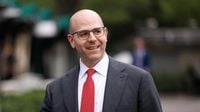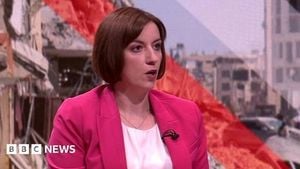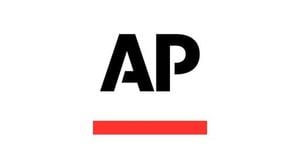In a move that’s already stirring controversy in Washington and on Wall Street, the U.S. Senate confirmed Stephen Miran to the Federal Reserve Board late Monday, September 15, 2025, by the slimmest of margins. The 48-47 vote, which mostly followed party lines, means Miran will step into his new role just as the Federal Open Market Committee (FOMC) gathers for a critical meeting this week—one where markets are bracing for the first interest rate cut since December 2024.
Miran’s confirmation, fast-tracked by the Senate, fills the vacancy left by former governor Adriana Kugler, who unexpectedly resigned in August. But it’s not just the timing that has ignited debate. Miran, who has served as chair of the White House Council of Economic Advisers since March, plans to take an unpaid leave of absence from that post rather than resign outright—a decision that’s raising pointed questions about the Federal Reserve’s independence from the executive branch.
With the FOMC meeting set to begin Tuesday, September 16, Miran’s arrival comes at a moment of heightened tension between President Trump and the central bank. Trump has spent months publicly pressuring the Fed to lower interest rates, even floating the idea of firing Fed Chair Jerome Powell for not moving fast enough. In July, Trump called Powell a "knucklehead" and "numbskull" for resisting his demands, according to NPR. And in August, Trump escalated his fight with the Fed by attempting to remove Governor Lisa Cook, the first Black woman to serve on the board—a move that has since been blocked, at least temporarily, by a federal appeals court.
"One day of serving as the President's chief economist and a supposedly independent Governor at the Fed would be one day too many," warned Senate Banking Committee Ranking Member Elizabeth Warren, D-Mass., before Miran’s nomination cleared her committee on a party-line vote last week, as reported by Bloomberg. Republican Senator Lisa Murkowski of Alaska broke ranks and joined Democrats in opposing the confirmation, underscoring just how divisive the appointment has become.
So who is Stephen Miran, and why is his appointment causing such a stir? Miran, a Harvard-educated economist, has moved between the worlds of finance and public policy since earning his Ph.D. in 2010. His early career included stints at Lily Pond Capital Management, Fidelity Investments, and Sovarnum Capital, before he joined Trump’s Treasury Department as a senior advisor in 2020. After the Biden administration took office, Miran returned to private finance and think-tank work, notably at the Manhattan Institute, where he published a series of opinion pieces critical of Biden’s economic agenda and, crucially, advocating for a less independent Federal Reserve.
In a March 2024 op-ed, Miran wrote, "Central bank independence is widely regarded as an essential element of effective economic stewardship. Yet pure independence is incompatible with a democratic system." He’s proposed reforms such as shortening Fed board members’ terms and making it clear they serve at the will of the president—ideas that have alarmed many who see the Fed’s autonomy as a bulwark against political meddling in monetary policy.
At his Senate Banking Committee hearing earlier this month, Miran was pressed repeatedly on whether he would resign from his White House post if confirmed to the Fed. His answer: no, but he would take an unpaid leave of absence. "I have received advice from counsel that what is required is an unpaid leave of absence from the Council of Economic Advisers," Miran told the committee. "And so, considering the term for which I'm being nominated is a little bit more than four months, that is what I will be taking." He added that if he were nominated and confirmed for a longer term, he would resign from the White House entirely.
This unprecedented arrangement—remaining a White House employee on unpaid leave while serving as a supposedly independent Fed governor—has drawn sharp criticism from lawmakers and watchdog groups alike. Lisa Gilbert, co-president of the consumer advocacy group Public Citizen, told NPR, "It functionally means he remains a White House employee at the same time as working for the importantly independent Federal Reserve. So we're really concerned about this and what it means for the independence of this agency."
The White House, for its part, insists that Miran will not be involved in administration business during his leave. Spokesperson Kush Desai told NPR that Miran would lose his White House badge and email access and "not provide any advisory guidance as part of CEA in any way." Desai also pushed back on the criticism, saying, "Instead of resorting to ignorant or intentionally misleading attacks, Democrats and 'nonpartisan' watchdog groups should just admit that Dr. Stephen Miran is eminently qualified to serve on the Fed, and he will do so in compliance with the law."
Still, the optics are hard to ignore. As Miran steps into the Fed boardroom, President Trump is simultaneously trying to remove Lisa Cook from the board, citing allegations of mortgage fraud—allegations Cook has denied and is fighting in court. A federal appeals court ruled Monday that Cook cannot be removed before this week’s FOMC meeting, ensuring she will be present for the crucial rate decision.
Markets are now watching the Fed’s next move with bated breath. Chair Jerome Powell, who has so far resisted Trump’s pressure campaign, signaled last month that economic uncertainty—including fallout from Trump’s tariffs on U.S. trading partners—could justify a rate cut at this meeting. The last FOMC vote in July saw members overwhelmingly opt to keep rates steady, but with Miran now in the mix, some fear the administration’s influence over monetary policy could grow, even if he’s not the swing vote this week.
Miran’s appointment is for a short term—he’ll serve until January 31, 2026, finishing out Kugler’s original tenure. But Trump has already signaled he may nominate Miran for a full 14-year term when the next vacancy opens. For now, Miran insists he’ll act independently. "I will act independently, as the Federal Reserve always does, based on my own personal analysis of economic data," he told the Senate.
Yet, as the dust settles from Monday night’s vote and the FOMC meeting gets underway, concerns about the Fed’s independence are unlikely to fade. As Gilbert of Public Citizen put it, "The central bank is intended to keep us stable. It matters for regular Americans as we think about our economy, as we think about how we are interacting as consumers. And it is simply a problem to have it not be independent."
With so much at stake for the U.S. economy—and the integrity of the nation’s most important financial institution—Washington will be watching closely to see just how independent the Federal Reserve remains in the months ahead.




